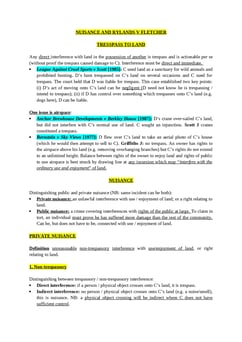Horrocks v Lowe [1975] AC 135
Judgement for the case Horrocks v Lowe
Table Of Contents
At a Local Council meeting, Defendant, one councillor, accused another, Plaintiff, of misleading one of the property committee of which he was chairman. Defendant wanted Plaintiff to be removed from the committee since Plaintiff had many property interests and hence a conflict of interests.
Plaintiff sued Defendant for defamation, Plaintiff claiming privilege and Defendant claiming that the privilege was overridden by malice.
HL found that since the defendant had not misused the privileged occasion, by using it for some purpose other than that for which the privilege was accorded to it in the public interest, his positive belief in the truth of what he said entitled him to succeed in his defence of qualified privilege.
Lord Diplock
In cases of qualified privilege, there is some public interest that justifies the making of defamatory statements.
If the privilege is used for some other reason (i.e. not for the purposes of the public interest which accords him the qualified privilege), the privilege is no longer a defence. Hence motive is important.
If some dominant motive is found, separate from the public interest which justifies the qualified privilege, then the defamer loses his defence. Positive belief in the truth of what one says defeats any claim that the motive was malice.
Recklessness (but not indifference) to the truthfulness of the statement is treated as knowledge that the statement was false.
Even a positive belief in the truth of what is published on a privileged occasion - which is presumed unless the contrary is proved - may not be sufficient to negative express malice if it can be proved that the defendant misused the occasion for some purpose other than that for which the privilege is accorded by the law.
Hence (1) honest belief in the truth of the statement and (2) making the statement in the public interest for which the privilege was granted are needed to defeat any claim of malice.
For Further Study on Horrocks v Lowe
Need instant answers? Our AI exam tutor is here to help.
Ask questions 🙋 Get answers 📔 It's simple 👁️👄👁️
Our AI is educated by the highest scoring students across all subjects and schools. Join hundreds of your peers today.
Get StartedSimilar Cases
Related Product Samples
These product samples contain the same concepts we cover in this case.

 Since 2010, Oxbridge Notes has been a trusted education marketplace, supplying high-quality materials from top achievers at universities like Oxford, Cambridge, LSE, Harvard, and Yale.
Since 2010, Oxbridge Notes has been a trusted education marketplace, supplying high-quality materials from top achievers at universities like Oxford, Cambridge, LSE, Harvard, and Yale.